This is my monthly wrap up where I talk about some of my favorite things from the last month. Things I’m reading, enjoying, looking forward to—sort of anything floating my boat.
When I was writing my novel, I thought a lot about the lifecycle of flowers. The way that these cycles are present in nature and also in our lives fascinates me. There are so many parallels to be drawn here, but I’ll save that for the book.
All this to say, this year, I leaned into tulips season really hard and I don’t want to go back. It’s just one of those things that finally makes sense to me. I never cared about flowers before, but now all I see is their drama, their life, their beauty. You won’t catch me coming over to your house empty-handed for the foreseeable future.
Florals for spring, you know the rest.
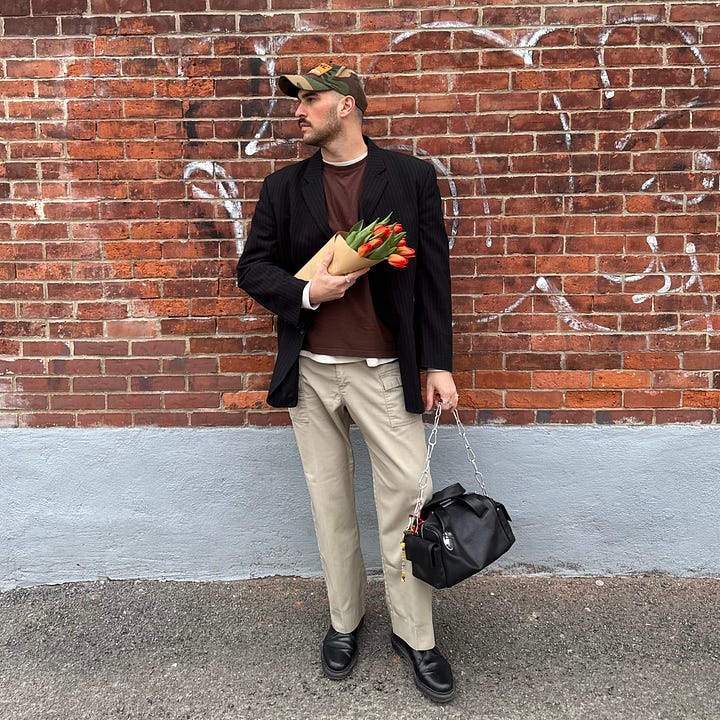
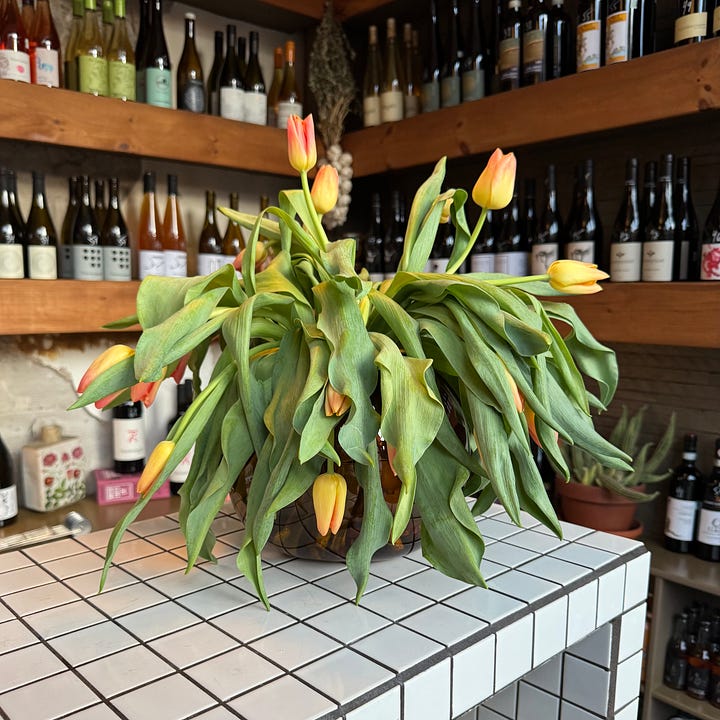
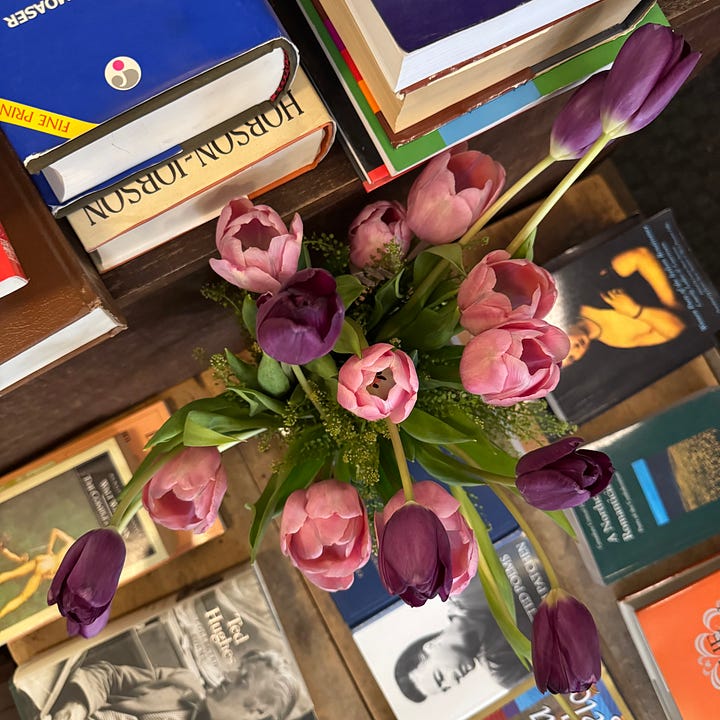
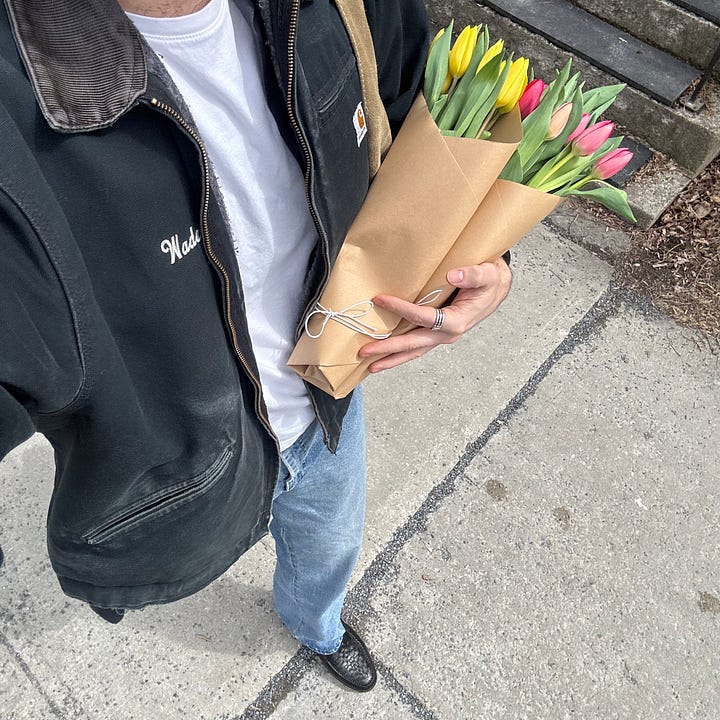
Here is an overview of how my month went:
Did a guest spot on my friend
’s Substack
Read it here 😇Two pieces I wrote got accepted for publication, and I can’t wait to share them when I can!!!
Got an advanced screener of The Surfer starring Nic Cage… what a freaky little film. I really enjoyed it!
Binged The Pitt in a week and it’s just as good as people have been saying
I got through April, and you know what? That’s enough for me this month.
What I Read
Below is a rundown of every book I read last month. I’ll be adding a star next to my standouts, like a starred review where a star isn’t a 1 to 5 scale, it just means good!
Before the written ramblings, here is a video version of my monthly wrap up if you’re more of a visual person:
Detransition, Baby by Torrey Peters ★
This book was even better than I remembered it being. I read this when it came out, and have wanted to revisit it ever since. Detransition, Baby gets dragged into every round-up and conversation about queer books, and I was reminded of why.
Torrey Peters writes about queers: flawed, messy, bad, good, full people. Her stories explore a queerness from a queer lens. You’d think this is the standard, but it’s not.
The novel sees three people with different relationships to their gender intersect in a complex dynamic of parenthood and partnership. I said this about Stag Dance when I read it last month, but Torrey Peters is not writing things with the goal of making them palatable to straight, cis audiences. She’s making you google it if you don’t know, and I love that. So many times I’ve written a sentence and felt the need to explain a queer thing, but this reminds me I don’t always have to.
The writing in this also has the incredible quality of being silent but deadly. It washes over you with such ease that you don’t even realize you’ve waded into the deep end without floaties on.
Torrey Peters, they could never make me hate you.
Sunrise on the Reaping by Suzanne Collins
I had to know! I had to know.
I’m not going to sit here and tell you that YA is something I read often. It’s not. But that doesn’t mean I don’t have the capacity to enjoy it—I loved the Legendborn series, I cried my eyes out to the Heartstopper novels.
This particular brand of YA (the 2007-dystopian-era YA) is just not for me anymore. The parts of this book I enjoyed worked for me because of nostalgia. I loved feeling like I’d waited in line at Chapters across from Fairview Pointe-Claire for the midnight release, clutching a Hunger Games novel and swearing I had a crush on Genny Campbell.
Where this book didn’t work for me was the elements of this kind of YA I can no longer ignore: the constant repetition, the over-explaining, the languid then rushed pace. This wasn’t for me, and because of that it feels unfair to critique it any further.
I am excited about the movie though!
On a Woman’s Madness by Astrid Roemer (translated by Lucy Scott)
This is a queer classic from the 1980s and follows Noenka, a young woman searching for more, as she leaves her hometown just days after announcing she was divorcing her husband. The premise was enough to get me hooked on the book, but I’m afraid it never really did what I hoped it would.
The book has virtually no chronology, and is completely stream of consciousness. If you know what The Artist’s Way is, this reads like a novel made up of morning pages. The nebulous quality of the narrative feels like it has a purpose by showing us the inner world of a person who is chasing freedom while knowing she’ll never really get it, but the way it’s written means so much is left out.
We only get a glimpse of a backstory and we can only sort of assume that her husband was a bad man, but these things are like whispers in another room when they warrant a yell.
I kept waiting for everything to click into place and it never really got there for me. I love a scattered novel but sometimes it can feel like I’m just looking at words on a page, and that’s not how I like to read.
This was a book I forced
and to read with me… So this is my public apology to both of them. It allowed us to have some great discussions about the topics it brings up, but I think we all wanted more.Hunchback by Saou Ichikawa (translated by Polly Barton)
This is the story of Shaka, a woman with a congenital muscle disorder, as she navigates desire and her complex feelings about agency over her own body. It was on my list for a long time, and when
did an interview with the author, I just had to read it immediately.While it dissects a disability narrative we often don’t get, it’s also weird, funny, dark, and so so great. People with disabilities aren’t just one thing, they can be flawed and sexually adventurous and write smutty stories online and tweet deranged things.
I’ve seen people say this felt like it relied on shock value, but that’s not how it read to me. It has the 29,836th blowjob scene I’ve read in literature and it wasn’t shocking because a breathing tube is involved, sorry.
There’s also a through line of obsession with pregnancy and abortion that was so fascinating to me. It was like the narrator wanted to stake the ultimate claim on her body by being able to conceive and choose to end the pregnancy. I’ve only ever since this kind discussion in trans narratives, so this was a really interesting take for me.
This book is just over a hundred pages, and well worth the time. I’m very excited to see what Ichikawa does next.
Scaffolding by Lauren Elkin ★
Scaffolding is a novel in two parts: a woman who just had a miscarriage and a couple who are thinking of having children, both sets of characters are living in the same Parisian apartment 40 years apart.
The book dissects grief and the desire for parenthood in an almost clinical way. It’s so in-depth you can taste the emotions. I loved the way it digs into distance, both physical and emotional, and how this affects relationships.
So many passages of this novel will stay with me for a long time. It was so simply rendered, but so well done.
There is so much we will never know about other people, no matter how much we love them, or how much time we spend with them.
p.243, Scaffolding
Both parts mirror and also contrast each other. They stand on their own, but together they shine so bright. Maybe it was the grey skies while I was reading it, or maybe it was just talking about identity in a specific way I’ve been thinking about lately, but it really worked for me. There is something really special about the right book finding you at the right time, and this is what happened here.
The Vegetarian by Han Kang (translated by Deborah Smith) ★
This Booker Prize winning novel is about a woman who decides to become a vegetarian, but this choice creates a ripple effect on her life and the lives of those around her. It’s freaky, it’s edgy, it’s really great.
The Vegetarian is a stunning exploration of agency and control. We follow a woman living in a patriarchal society with pressures from her family and the people around her. How could she decide she no longer wants to eat meat?
I loved that the reader gets her story told from the perspectives of different people in her life and, as we get deeper into the novel, we start to have our opinion shaped by their views of her choices.
There’s also an element of nature, and its place in the modern world that I found really fascinating. The book explores this through her transformation that stems from this seemingly innocuous decision of renouncing meat. The metaphor builds and builds, goes further than I’ve ever read and really works.
I’m so excited to keep reading Han Kang this year. She’s such a talent, and I think her books get even weirder from here, which I love!
La colline qui travaille by Philippe Manevy ★
This is a piece of autofiction/memoir from a writer living in Montreal whose family is from Lyon. He digs into four generations on his mother’s side and renders them plainly, with curiosity and love.
My caveat to this review is that I am a writer living in Montreal whose family is from Lyon—I would be lying if I said that context didn’t play a part in me loving this book.
My favourite part of the memoir genre is when you can feel the author discovering alongside you, the reader. This is what’s at play here. Manevy questions his mother about things she doesn’t want to discuss, he breathes life into family photos and old stories.
There’s a real sense of him wanting to look back at himself through the mirrors that came before.
I think this kind of story can resonate with a lot of people because most are interested in what has come before them. Personally, I couldn’t stop picturing the street in Lyon where my mother grew up, the smell of the apartment we packed up when my grandmother went into a care home, the photos of my great-grandparents dancing… It really hit me hard, and I’m so glad I read it.
Nova Scotia House by Charlie Porter ★
Nova Scotia House is about love, queer community, finding the people who make you feel like yourself. It showcases a heart that has been shattered by the AIDS crisis, and what it can look like to pick up the pieces. It’s hazy and visceral, soft and hard.
What this book does is walk us through survivor’s guilt and grief in a way that feels so real. This isn’t reaching for the heartstrings, it just tugs them effortlessly.
The writing style is cold and detached. At first, I couldn’t connect to it, but when it clicked I could not put it down. We’re being held at arm’s length and it really works.
It wasn’t about queerness in opposition to straight people. It wasn’t about trying to find a place within straight society at all. It was queerness for and of itself, and it was fertile, creative, it was bounteous.
p.67, Nova Scotia House
I’ve said this before, and I’ll say it again: For me, an AIDS narrative has to be exceptional to feel earned. Nova Scotia House earns it and then some.
This reminded me how much I love being queer.
On My Bedside Table
A dispatch from my bedside table and the books that litter it, hoping to be read soon.
Leaving the Atocha Station by Ben Lerner, an American poet in his early 20s loiters around Madrid in 2004.
Minor Feelings by Cathy Park Hong, essays about race in America that blend memoir and cultural criticism.
The Lookback Window by
, a survivor of sex trafficking gets the chance to sue his abusers.All This Could be Different by Sarah Thankam Mathews, a story about a queer, first-generation woman who graduates college as the recession hits.
Human Acts by Han Kang (translated by Deborah Smith), political unrest in South Korea, student uprisings, and brutal violence.
Have you read any of these? Are any of these non-negotiables? Are any of them skippable?
What did you read and love last month?
Tell me what you think in the comments!
That’s been my month!
Until next time 🤠


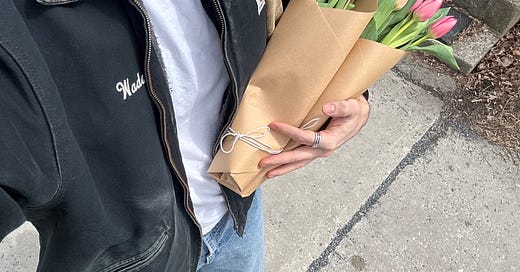





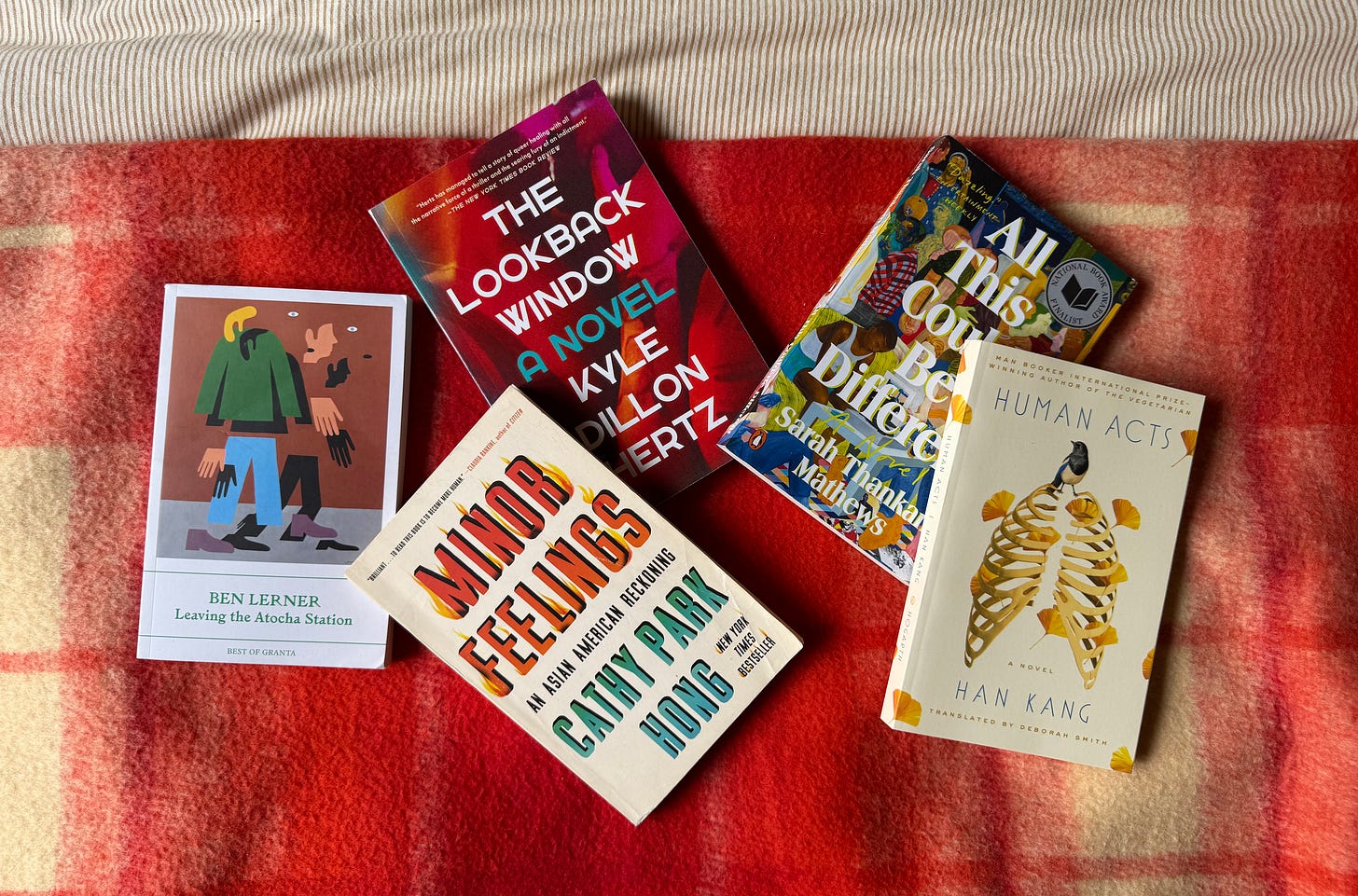
all this could be different is a NONNEGOTIABLE. i read it in 2023 and it was easily one of my favorites of the year.
i also have been thinking about rereading detransition baby ever since finishing stag dance---good reminder !!!
lmk what you think of minor feelings!!! absolutely love cathy park hong